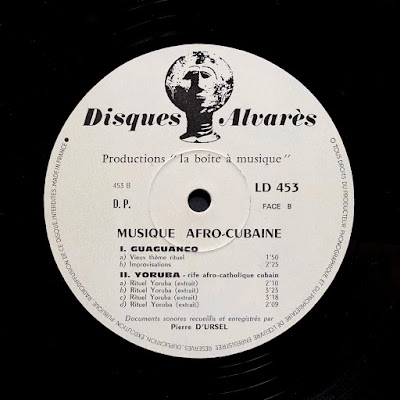Cuba – Musique Afro-Cubaine – Disques Alvarès 453, recorded by Pierre d'Ursel (LP)
Following our posts on Haitian Vodun (Vaudou), Jamaican traditional music and Brazilian Capoeira, we continue our exploration of the African musics introduced to the Americas by slaves, which proved vital for preserving African spiritual and philosophical systems. The Cuban Santeria, or Lucumi, showcased here is dominated by the Yoruba religion from Western Nigeria and Benin. The Yoruba believe that Olodumare (God) is the source of all the Ashé (life force) in the Universe, and sent the Orisha divinities to govern the earth. Santeria also incorporates Roman Catholic elements, where each Yoruba divinity (Ogun, Yemaya, Obatala, etc.) is associated with a Christian saint summoned through music and trancelike dancing.
This LP features a Santeria which narrates the tumultuous relationships between divinities symbolizing the struggle between good and evil, and good (Ogun) ultimately prevails (A1-A4); Yambu music (A5); proto-modern Rumba played by Los Papines (A6); Guaguanco music (B1-B2); and a Yoruba-Catholic ritual performed by the National State Ballet of Cuba (B3-B6).
Modern Cuban music (Son, Charanga, etc.), which helped forge a new Cuban identity, is the remarkable meeting of African rhythms, polyphony, call-response and dancing combined with Spanish tres guitar, language, harmony, and romanticism.
Suite à nos posts sur le Vaudou Haïtien, la musique traditionnelle Jamaïcaine et la Capoeira Brésilienne, nous poursuivons notre exploration des musiques et des religions africaines introduites par des esclaves Africains sur le continent Américain avec la Santeria (ou Lucumi) de Cuba dominée par les croyances Yoruba du Nigeria occidental et du Bénin. Les Yoruba considèrent qu'Olodumare (Dieu), qui est la source de toute force de vie Ashé dans l'Univers, a envoyé les divinités Orisha pour s'occuper des affaires terrestres. La Santeria incorpore également des éléments de la liturgie catholique, où chaque divinité Yoruba (Ogun, Yemaya, Obatala, etc.) est associée à un saint chrétien invoqué à travers la musique et la danse.
Cet album présente une Santeria sur les relations tumultueuses entre les divinités symbolisant la lutte entre le bien et le mal, avec l'ultime victoire du bien (Ogun) (A1-A4); de la musique Yambu (A5); une Rumba proto-moderne jouée par Los Papines (A6); de la musique Guaguanco (B1-B2); et un rituel Yoruba-Catholique exécuté par le Ballet National d’Etat de Cuba (B3-B6).
La musique Cubaine moderne (Son, Charanga, etc.) – qui a grandement contribué à forger une nouvelle identité Cubaine – est une synthèse remarquable de deux cultures musicales radicalement différentes: les rythmes, la polyphonie, l'appel-réponse (le choeur répondant au chanteur principal), et la danse de l'Afrique, et la guitare tres, l'harmonie et le romantisme Hispanique.
Download




Given your interest in Sitarist Ustad Sharif Poonchwale, you may want to listen to this - https://www.discogs.com/Ustad-Sharif-Sitar/release/8355866. If interested, I can share it with you.
ReplyDeleteI am indeed particularly fond of this artist and would love to listen to these recordings. You can send them to me at: music.republic.project@gmail.com. It's very kind of you. Bless
DeleteThanks...
ReplyDelete